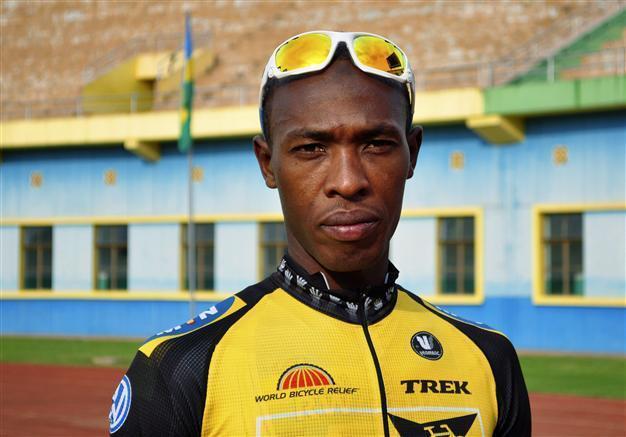Genocide survivor Niyonshuti to make Olympic debut
LONDON - The Associated Press

REUTERS Photo
Adrien Niyonshuti doesn’t need an Olympic medal to turn these games into a victory for himself or his country.
Sunday’s cross-country race marks the young Rwandan athlete’s highest competitive point so far, and the most he will say is that he hopes to finish in the top 20.
"If I said where I thought I’d finish I would be lying, because I don’t know how other people are feeling. I’ve kept to myself and I’m feeling good," he told The Associated Press in an interview this week.
No matter how Niyonshuti does, the London Games represent a remarkable achievement for Rwanda - its seven athletes at these Olympics are the most it has ever sent to any games - and for Niyonshuti, who survived his country’s genocide in 1994.
"He’s here, he’s representing his country, he’s representing good triumphing over evil," said Kimberly Coats, the Rwandan team’s marketing director. "That is victory and that’s the only statistic any of us need. He’s done us, himself and his country proud."
There were no medal expectations for any of Rwanda’s athletes at the London Games, and of the five that have performed so far, Robert Kajuga, who finished mid-pack in the men’s 10,000 meters, has been the most successful.
Niyonshuti, 25, was chosen as his country’s flagbearer at the opening ceremony in London, leading his compatriots around the track in what he described as an "amazing" experience. All but one of the Rwandans are competing in their first Olympics, and most had never taken part in an international tournament.
Still, this year’s numbers are a vast improvement on the three Rwandans who competed in the 1996 Atlanta Olympics a mere two years after the genocide that killed at least 500,000.
Niyonshuti was 7 years old when the ethnic majority Hutu tribe started to massacre the minority Tutsis. The rampage lasted 100 days, from April to July 1994. Niyonshuti’s six brothers were among the dead. He survived after hiding in the bush for a week with his parents.
Niyonshuti’s first race came exactly 10 years later, in the Tour of Rwanda. It lasted 10 days that year, and Niyonshuti came in seventh. Two years later, in November 2006, he won it, and caught the eye of Jock Boyer - the first American to cycle in the Tour de France.
Boyer was with American professional cyclist Tom Ritchey, who was touring Rwanda to set up a race called the Wooden Bike Classic, after the sturdy bicycles used by Rwandans to transport produce which are made entirely of wood - including the wheels.
Boyer began coaching Niyonshuti as part of his Team Rwanda project to help the country’s young cyclists.
"Since Jock moved from America to Rwanda, you can see how Rwanda has improved in cycling sports. I think he’s a good coach for Rwanda and me - and everyone," Niyonshuti said. "It would have been harder for me to get where I am if it wasn’t for him."
Niyonshuti is in the top cohort of African cyclists. He registered the quickest overall time in this year’s seven-day Cape Epic tournament, a grueling 781-kilometer (480-mile) seven-day race through South Africa.
Sunday’s cross country race in Hadleigh Farm, a 550-acre (220-hectare) site east of London, is designed to take a little more than 90 minutes to complete. Niyonshuti specializes in longer races that last several days. "I’m not a sprinter," he said. "If I was a sprinter I would like one-day races. I like the five- or six-day races.
Niyonshuti trained for the Olympics in the Swiss Alps, but normally prepares for a race in South Africa. He doesn’t spend a lot of time in Rwanda, because when he’s there - to visit family in his hometown Rwamagana or to race - he’s mobbed by fans, which he says breaks his focus.
But he does appreciate being cheered on.
"Some of my friends have come to watch me," he said. "It’s the first time Rwanda has a mountain bike competitor, so everyone gives support for me."
He’s not his country’s first Olympic cyclist. Three Rwandans competed in the men’s road race at the 1992 games in Barcelona, before the genocide. Niyonshuti’s debut at the Olympics, however, is evidence of the re-emergence of cycling in Rwanda.
Niyonshuti is even prepared to switch events to qualify for the 2016 Olympics in Rio.
"After this, the Olympics will be more about road bikes," he said. "I don’t know if I’ll be on a road bike or a mountain bike."
If it does come, the change to road bikes would allow him to pursue one more dream: the Tour de France. "I’m thinking of competing," he said. "One day."
For now, he’s focused on his first Olympic race.
"I’m not nervous - I’m excited. I think, now, I’m ready to do it."
